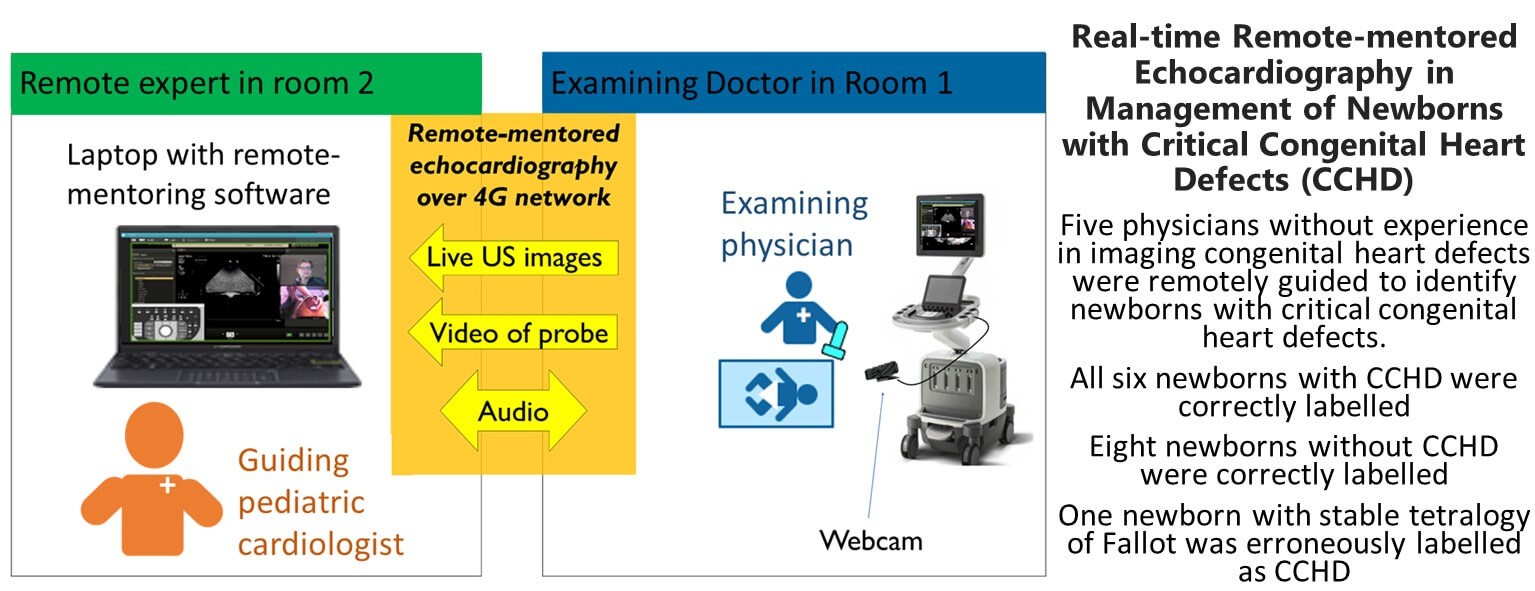 Open Access
Open Access
ARTICLE
Real-Time Remote-Mentored Echocardiography in Management of Newborns with Critical Congenital Heart Defects
1
Institute of Clinical Medicine, University of Oslo, Oslo, Norway
2
The Intervention Centre, Technology and Innovation Clinic, Oslo University Hospital, Oslo, Norway
3
Department of Informatics, University of Oslo, Oslo, Norway
4
Department of Pediatric Cardiology, Oslo University Hospital, Oslo, Norway
5
Department of Pediatrics, Oslo University Hospital, Oslo, Norway
* Corresponding Authors: Håvard Bjerkeseth Solvin. Email: ; Henrik Brun. Email:
Congenital Heart Disease 2023, 18(5), 551-559. https://doi.org/10.32604/chd.2023.031537
Received 30 June 2023; Accepted 07 August 2023; Issue published 10 November 2023
Abstract
Background: The management of suspected critical congenital heart defects (CCHD) relies on timely echocardiographic diagnosis. The availability of experienced echocardiographers is limited or even non-existent in many hospitals with obstetric units. This study evaluates remote-mentored echocardiography performed by physicians without experience in imaging of congenital heart defects (CHD). Methods: The setup included a pediatric cardiologist in a separate room, guiding a physician without experience in echocardiographic imaging of CHD in the examination of a symptomatic newborn. This remote-mentoring pair was blinded to the diagnosis of the newborn and presented with a simplified patient history. The echocardiographic images were streamed to the laptop of the mentor, along with a webcam feed showing the probe position. The task was to identify CCHD in need of immediate transfer to a pediatric cardiac surgical center. The result was compared to the previously completed echocardiographic report and the clinical decision of the patient-responsible pediatric cardiologist. Results: During 17 months, 15 newborns were recruited. All six newborns with CCHD were correctly labeled by the remotementoring pair. One newborn with Tetralogy of Fallot was erroneously labeled as needing immediate transfer. Eight newborns without CCHD were correctly labeled. Conclusions: Remote-mentored echocardiography performed by examiners without experience in imaging CHD identified all newborns with CCHD in need of immediate transfer for specialist care. The setup shows promising results for improving the management of CCHD in hospitals without continuous pediatric cardiology service.Graphic Abstract

Keywords
Cite This Article
 Copyright © 2023 The Author(s). Published by Tech Science Press.
Copyright © 2023 The Author(s). Published by Tech Science Press.This work is licensed under a Creative Commons Attribution 4.0 International License , which permits unrestricted use, distribution, and reproduction in any medium, provided the original work is properly cited.


 Submit a Paper
Submit a Paper Propose a Special lssue
Propose a Special lssue View Full Text
View Full Text Download PDF
Download PDF Downloads
Downloads
 Citation Tools
Citation Tools